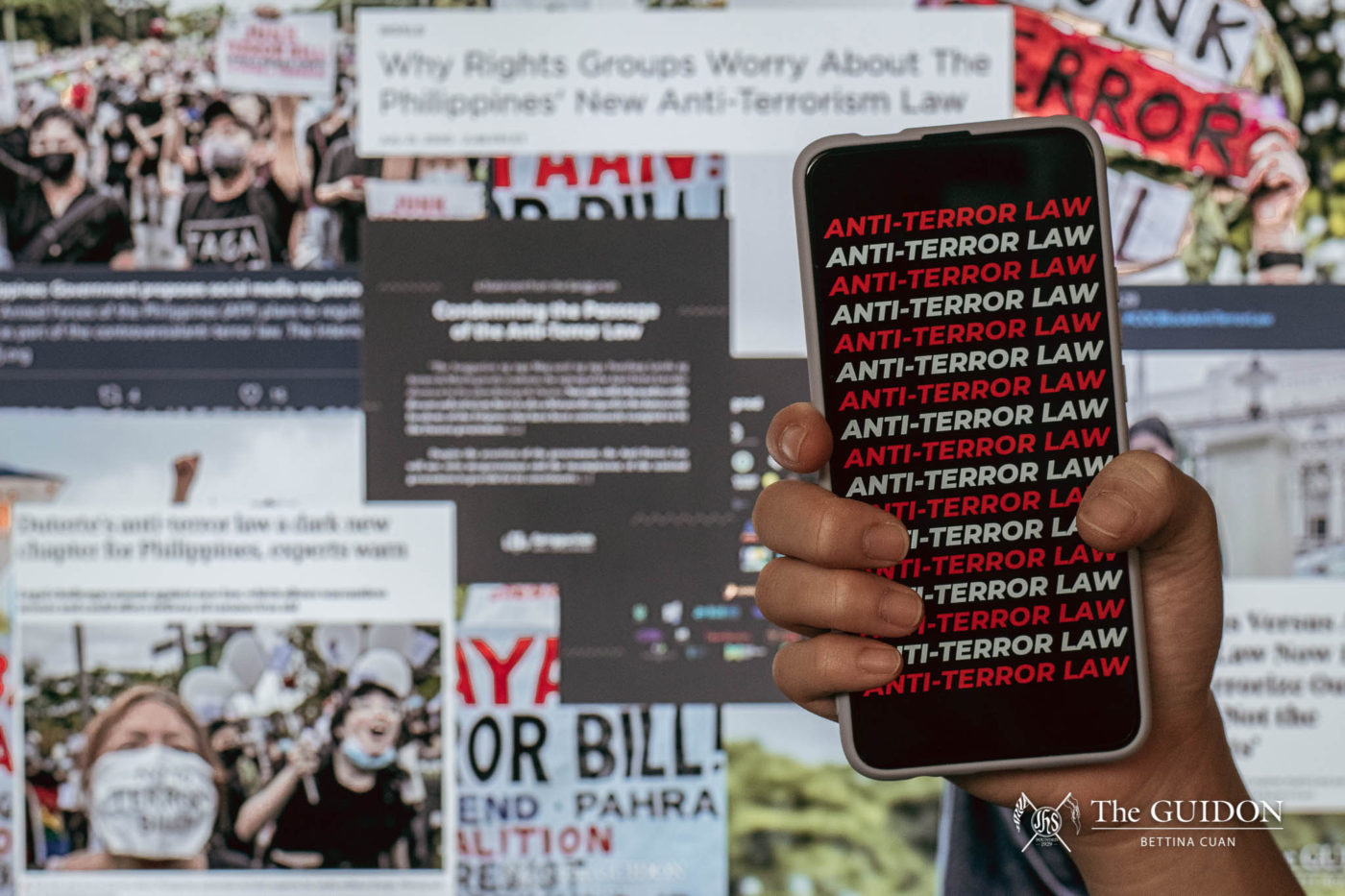“What are your thoughts on the recently passed Anti-Terror Law?”
“I agree with the importance of protecting citizens from possible terrorist attacks but the lack of clarity in the Terror Law allows it to be…susceptible to abuse, especially by our own administration. […] [Their] decision to pass a law such as this during a pandemic says so much about where their priorities lie—and it’s not with the people. Health measures should be their utmost priority along with providing relief measures to those who lost their jobs, front liners, students, public workers, etc.” (508)
Alyanna Arches
3 BS COMTECH
“People have protested, both online and offline, and the government continuously turns a blind eye and a deaf ear [to the requests of] their citizens. This behavior is unacceptable, and we, as Filipinos, know too well what it’s like to live in a country that we couldn’t call our own [given its lack of democracy]. I’ve said it before, but the Terror Bill takes the Filipino’s voice away. It can be seen in current events, and I truly wish for [its] retraction and revision because Filipinos—as citizens—have a right to speak and to be listened to.” (549)
Andie Cosio
2 BS ITE
“It’s unnecessary in the midst of the pandemic. Why now of all times [does the government] push a bill about terrorism which is not the present concern of the country? Instead of providing solutions to ease and resolve issues regarding the thousands of deaths [due to the pandemic], they decide to push [the bill]. What is their motive? What do they want out of this? We don’t really know, but what we know is that it is absurd.” (430)
John*
3 BFA ID
“The Anti-Terrorism Act of 2020 is a policy created to protect ‘life, liberty, and property from terrorism.’ Essentially, it seeks to criminalise acts deemed as ‘terrorism’ by the state. While the prospect of such may inherently seem to be for the nation’s best interest, fault is found in the vagueness and flexibility of the act. There is much that can be picked apart: from the broadness of the definition of an ‘act of terrorism’ to the arguably unconstitutional path it clears for 14-24 day detainment without charge.” (522)
Nix*
3 AB DipIr
“The Anti-Terrorism [Law] threatens the constitutional rights and dignities of Filipinos. Beyond that, prioritizing the passage of this bill over implementing effective medical solutions for this pandemic is alarmingly concerning. It sends the message that the administration would rather silence the voices of the citizens instead of addressing the incompetencies and issues that concern the Filipinos’ health and livelihood.” (427)
Apple*
3 AB DipIr
“The recent signing of the Anti-Terrorism Law is highly inappropriate and even inhumane, considering [its] timing. […] While the lawmakers say it’s for good intention, government officials can easily use the law in order to regulate the response of the people to their liking, and doing so by labeling them as “terrorists” based on their standards. This opens up a door for the dangers of unchecked powers due to its unconstitutional nature.” (443)
Jok de Leon
2 AB PSY
“We’re supposed to look to the law for clarity, and we’re also supposed to hold our government accountable. But the recent signing of the Anti-Terror Law proved grim on both fronts. There’s now an overly broad definition of what can be punishable as ‘terrorism,’ with Sec. 9 stating that even ‘incitement’ by speech, proclamation, or making banners merits imprisonment. I also agree with other human rights advocates that it’s alarming how much oversight this law will grant the executive branch of government as compared to the judiciary.” (540)
Maria Amparo Warren
Professor, Fine Arts Department
“The passing of the Anti-Terrorism Law ironically left me terrified. There were plenty of issues raised in opposition to its signing: unconstitutional warrantless arrest, unspecified anti-terror council standards, abuse and lack of confidence in implementation—sectors nationwide were pushing for revision or repeal from their representatives and via petitions! [The fact] that those calls went completely unheeded was, for me, a downright chilling display of what little regard some people in power have for the vulnerable affected by their agenda.” (550)
Mella Tapia
2 BS PSY
“While there are legitimate concerns about terrorism in our country, we should not weaponize the law. Without proper oversight and clearer definitions, signing this into law would be paramount to legalizing government abuse of power. We must ask ourselves by supposedly limiting the threat of terror, do we increase the threat of government abuse?” (295)
Matthew Flores
2 AB POS-MPM
“I categorically disagree with the ethics of the recently enacted Anti-Terrorism Law. Under the Ateneo Economics Association, we cited these main points for our dissent: Firstly, we believe that this is blatant democratic suppression as the vague wording in the act [is] a danger to those who dissent. The law can thus be abused by the powerful for their own benefit. Secondly, we believe that this is a misdirected priority in a health crisis, as this was passed before any economic stimulus package with provisions for public health accountability.” (551)
Jt Valiente
President, Ateneo Economics Association
*Editor’s Note: Some interviewee names have been changed upon their request to protect their identities.




